1 - The eternal recurrence of the same
Published online by Cambridge University Press: 04 August 2010
Summary
To paraphrase Kant, it remains a scandal to Nietzsche scholarship that we are obliged to assume the centrality of his doctrine of eternal recurrence but we are not able to give a satisfactory reply to anyone who may claim to refute this doctrine. Because Nietzsche has proven so insightful in so many areas of inquiry, we want to believe him when he tells us that eternal recurrence was his most important discovery ever. But in truth, ever since Georg Simmel's summary dismissal in 1907, even Nietzsche's admirers have conceded that his emphasis on the complete qualitative identity of eternal recurrence renders his idea insupportable, insignificant, and incoherent.
Thus, if we are to solve the riddles of Nietzsche's Zarathustra, we need to begin by refuting Simmel's influential dismissal of its motivating idea. This is what I propose to do in this chapter, before turning to Zarathustra proper. In this chapter, I argue that Simmel's critique rests upon a premise that assumes the denial of Nietzsche's doctrine. Without this premise, we are free to see that Nietzsche did indeed believe in the truth of cosmological eternal recurrence and considered this belief supportable, significant, and coherent. This reading of Nietzsche's doctrine will in turn allow us to revisit his clue for understanding Zarathustra. Because commentators have followed Simmel in dismissing this doctrine, they have not been in a position to understand the engine that drives the narrative of Nietzsche's prose poem.
- Type
- Chapter
- Information
- The Death of Nietzsche's Zarathustra , pp. 11 - 31Publisher: Cambridge University PressPrint publication year: 2010



